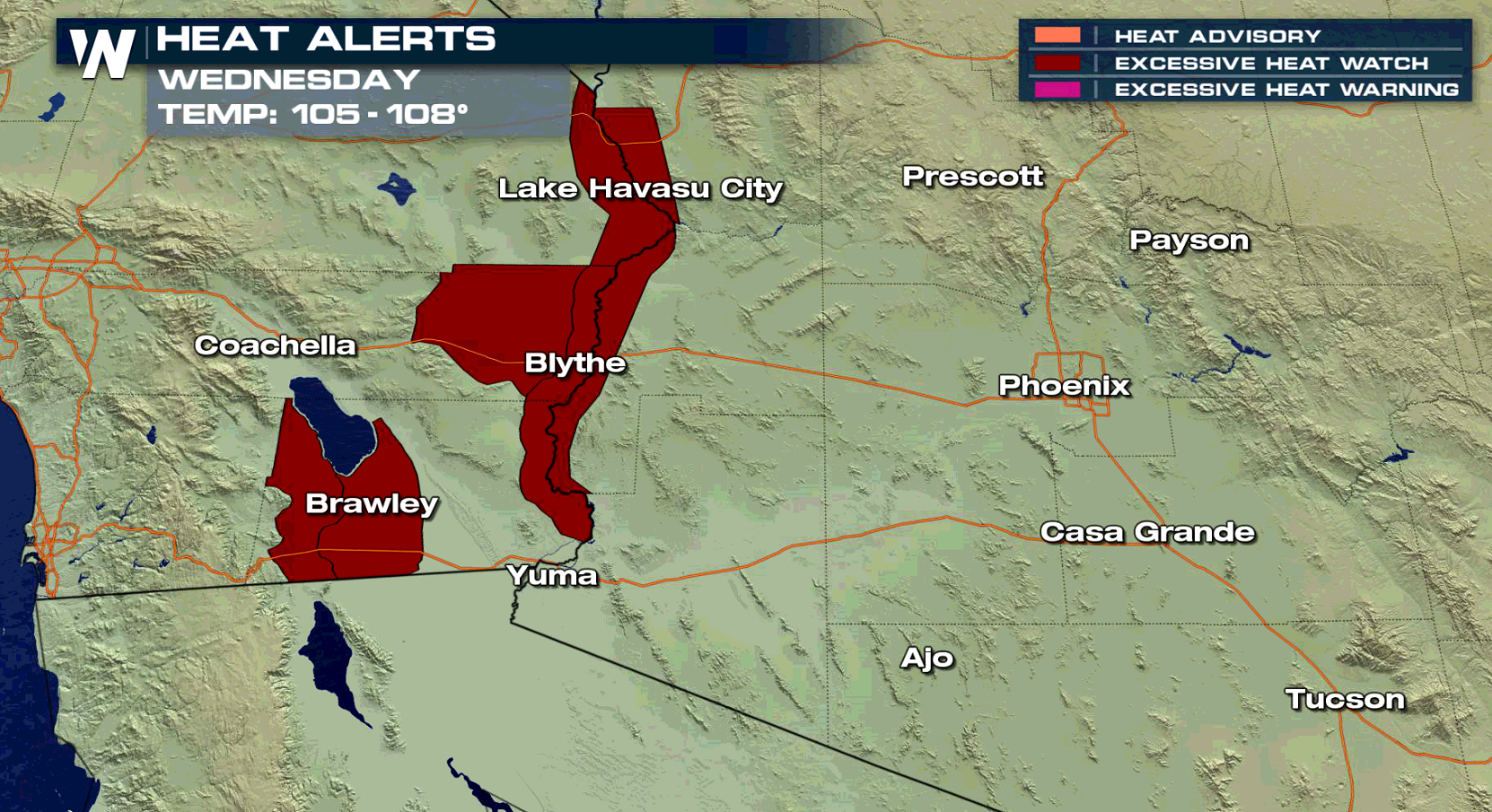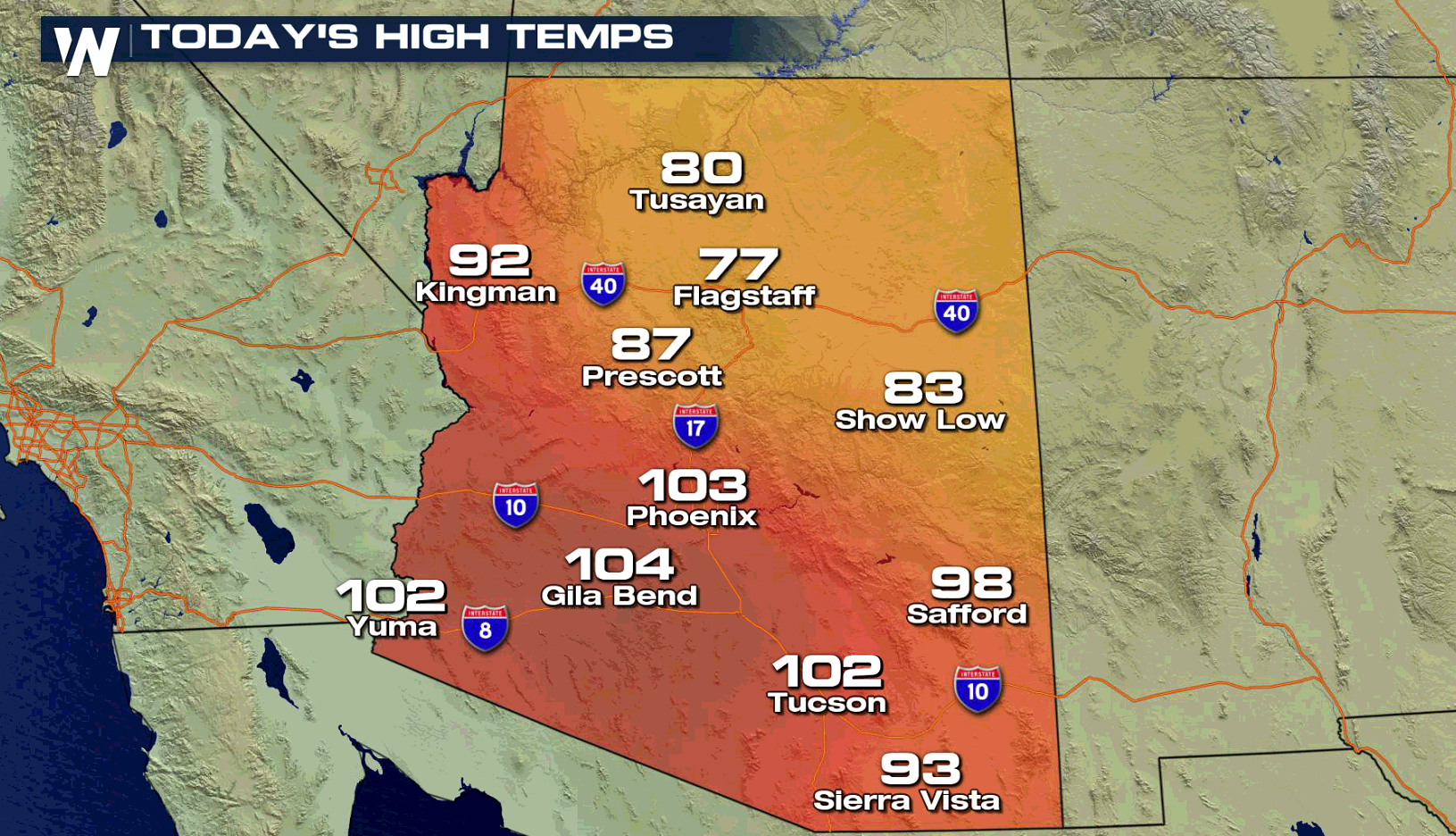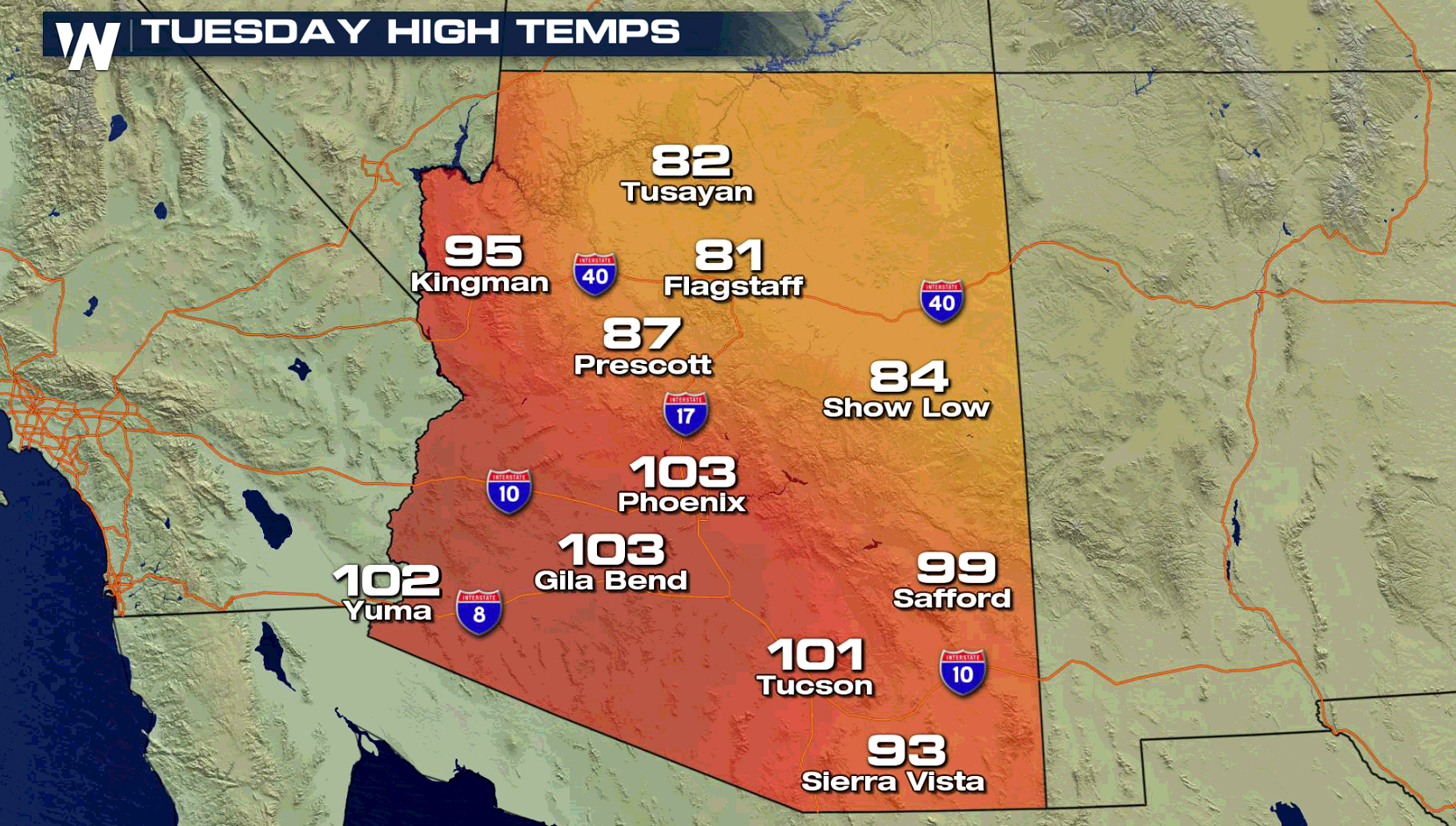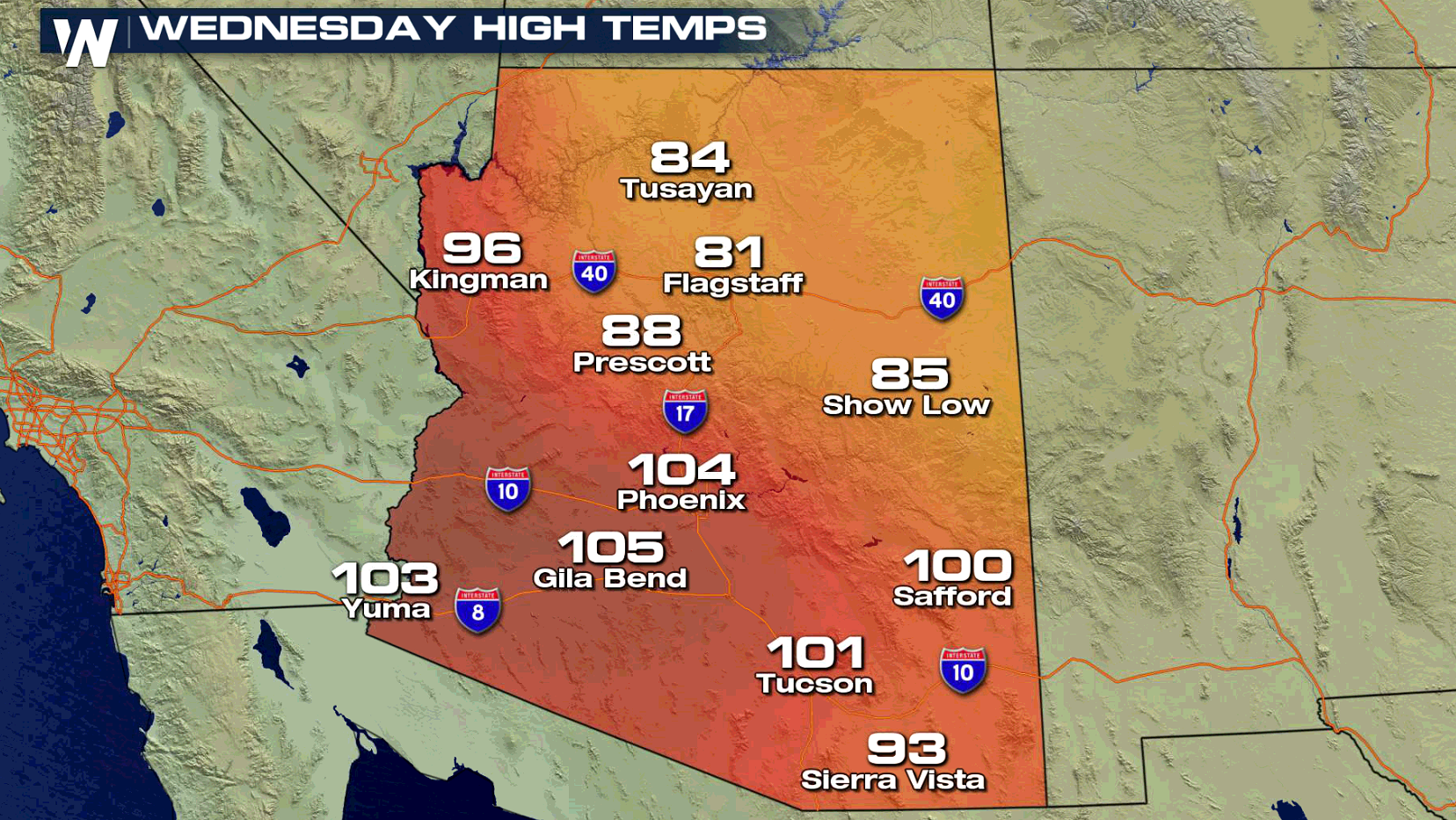More Heat Ahead for the Southwest
Special Stories
7 May 2018 9:47 AM
It was a weekend of heat in the Southwest with record setting highs in parts of the desert areas of California and Arizona. Phoenix set a record high of 106 on Sunday. Temperatures have dropped slightly today, but the furnace will crank back up later this week. Excessive Heat Watches have been issued for Wednesday along the Colorado River and in the Imperial Valley.

 Highs will reach 105 to 110 degrees Wednesday in the watch area. When the mercury climbs above 105, the potential for heat related illness significantly increases. Those working or being active outdoors during the daytime or without access to adequate air conditioning will be most at risk.
https://twitter.com/NWSVegas/status/993461931590733824
https://twitter.com/NWSPhoenix/status/993476795633754112
Never leave kids or pets unattended in cars. Drink more water than usual and avoid alcohol, sugar, and caffeine. When outdoors, wear light colored clothing and a wide-brimmed hat to keep your head and body cooler. Take frequent rest breaks in shaded or air conditioned environments. Public places with air conditioning include libraries, community centers, government buildings, malls, and special refuge stations.
Recognize the signs and symptoms of heat illness. Early symptoms include things such as headache, thirst, and muscle cramps. Serious symptoms include weakness, skin that is cool to the touch, fast but weak pulse, nausea, and fainting. Severe symptoms include hot and red dry skin, fast and strong pulse, sweating that has stopped, and unconsciousness. Untreated heat illness can lead to fatal heat stroke.
Highs will reach 105 to 110 degrees Wednesday in the watch area. When the mercury climbs above 105, the potential for heat related illness significantly increases. Those working or being active outdoors during the daytime or without access to adequate air conditioning will be most at risk.
https://twitter.com/NWSVegas/status/993461931590733824
https://twitter.com/NWSPhoenix/status/993476795633754112
Never leave kids or pets unattended in cars. Drink more water than usual and avoid alcohol, sugar, and caffeine. When outdoors, wear light colored clothing and a wide-brimmed hat to keep your head and body cooler. Take frequent rest breaks in shaded or air conditioned environments. Public places with air conditioning include libraries, community centers, government buildings, malls, and special refuge stations.
Recognize the signs and symptoms of heat illness. Early symptoms include things such as headache, thirst, and muscle cramps. Serious symptoms include weakness, skin that is cool to the touch, fast but weak pulse, nausea, and fainting. Severe symptoms include hot and red dry skin, fast and strong pulse, sweating that has stopped, and unconsciousness. Untreated heat illness can lead to fatal heat stroke.


 For WeatherNation: Meteorologist Mace Michaels
For WeatherNation: Meteorologist Mace Michaels

 Highs will reach 105 to 110 degrees Wednesday in the watch area. When the mercury climbs above 105, the potential for heat related illness significantly increases. Those working or being active outdoors during the daytime or without access to adequate air conditioning will be most at risk.
https://twitter.com/NWSVegas/status/993461931590733824
https://twitter.com/NWSPhoenix/status/993476795633754112
Never leave kids or pets unattended in cars. Drink more water than usual and avoid alcohol, sugar, and caffeine. When outdoors, wear light colored clothing and a wide-brimmed hat to keep your head and body cooler. Take frequent rest breaks in shaded or air conditioned environments. Public places with air conditioning include libraries, community centers, government buildings, malls, and special refuge stations.
Recognize the signs and symptoms of heat illness. Early symptoms include things such as headache, thirst, and muscle cramps. Serious symptoms include weakness, skin that is cool to the touch, fast but weak pulse, nausea, and fainting. Severe symptoms include hot and red dry skin, fast and strong pulse, sweating that has stopped, and unconsciousness. Untreated heat illness can lead to fatal heat stroke.
Highs will reach 105 to 110 degrees Wednesday in the watch area. When the mercury climbs above 105, the potential for heat related illness significantly increases. Those working or being active outdoors during the daytime or without access to adequate air conditioning will be most at risk.
https://twitter.com/NWSVegas/status/993461931590733824
https://twitter.com/NWSPhoenix/status/993476795633754112
Never leave kids or pets unattended in cars. Drink more water than usual and avoid alcohol, sugar, and caffeine. When outdoors, wear light colored clothing and a wide-brimmed hat to keep your head and body cooler. Take frequent rest breaks in shaded or air conditioned environments. Public places with air conditioning include libraries, community centers, government buildings, malls, and special refuge stations.
Recognize the signs and symptoms of heat illness. Early symptoms include things such as headache, thirst, and muscle cramps. Serious symptoms include weakness, skin that is cool to the touch, fast but weak pulse, nausea, and fainting. Severe symptoms include hot and red dry skin, fast and strong pulse, sweating that has stopped, and unconsciousness. Untreated heat illness can lead to fatal heat stroke.


 For WeatherNation: Meteorologist Mace Michaels
For WeatherNation: Meteorologist Mace MichaelsAll Weather News
More